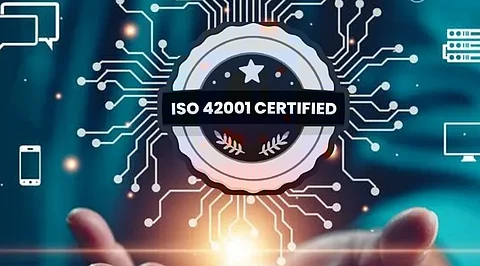

Artificial Intelligence is transforming industries worldwide by driving innovation and improving decision making. While AI brings many benefits, it also creates new risks around ethics, security, and trust. Organizations are under pressure to show that they use AI responsibly and transparently. ISO 42001 certification helps businesses create structured frameworks for managing these risks. This standard provides clear guidance on AI governance, accountability, and risk management practices. Many companies are exploring how to achieve ISO 42001 compliance to strengthen trust with customers and regulators. Certification shows a commitment to using AI in a way that is ethical and secure. This focus on responsible AI practices can improve market reputation and create a competitive advantage. ISO 42001 is built to support organizations as they develop and deploy AI systems. It helps companies identify risks, manage data responsibly, and maintain clear oversight of AI operations. The framework ensures that AI technologies are used in ways that align with organizational goals and social responsibilities. Implementing these practices reduces legal and reputational risks. It also supports innovation by building trust in AI solutions. Any company, big or small, can really benefit from using these ideas to plan its AI. Adopting this standard signals a commitment to responsible technology use and long-term sustainability. Businesses looking to improve trust and reliability in AI often see ISO 42001 as an important investment.
ISO 42001 sets guidelines for AI governance and risk management. It outlines best practices for monitoring AI performance, evaluating its impact, and ensuring ethical use. The goal is to help businesses maintain control over complex AI processes. It also helps organizations align AI systems with internal policies and external regulations. Following this standard can reduce risks related to data bias and unintended outcomes. It also encourages transparency and accountability across all levels of AI development. Companies that follow ISO 42001 often see stronger customer and stakeholder confidence. This framework offers a structured approach to addressing challenges unique to artificial intelligence.
Achieving ISO 42001 certification brings multiple benefits to organizations. It provides a recognized benchmark for responsible AI use. Certification demonstrates a commitment to data security and ethical practices. It helps businesses build stronger relationships with customers and partners. Meeting the certification requirements can also improve internal processes and decision-making. It fosters better collaboration between technical teams and leadership. Many companies also experience fewer compliance risks and legal issues. These benefits make certification a strategic advantage for organizations using AI technologies.
A successful ISO 42001 program requires planning and collaboration. Organizations often begin by evaluating current AI practices and identifying gaps. Teams then create policies and procedures that meet the standard’s requirements. Training helps employees feel prepared and supported in their work. Regular assessments help maintain compliance and address potential issues early. Leadership support ensures that AI governance remains a priority across all business areas. Documentation plays a critical role in demonstrating compliance during audits. With these steps, companies can create a sustainable and efficient AI compliance framework.
AI systems evolve quickly and require constant oversight. Continuous monitoring helps identify issues before they affect performance or compliance. It ensures AI systems remain aligned with ethical and operational goals. This ongoing process includes reviewing data quality, evaluating outcomes, and updating policies. Regular reviews also support innovation by encouraging safe experimentation with AI technologies. Continuous improvement keeps compliance programs relevant as technology and regulations change. It also strengthens customer and stakeholder trust. This approach turns compliance into an ongoing business advantage rather than a one-time task.
Many organizations seek external expertise to streamline ISO 42001 compliance efforts. Experienced consultants can interpret the standard’s requirements and design practical solutions. They often assist with training, documentation, and risk assessments. External support helps businesses avoid common mistakes and reduce implementation time. Consultants can also guide organizations through certification audits with confidence. This partnership allows internal teams to focus on strategic AI initiatives. It also ensures compliance programs meet industry best practices. Expert guidance can accelerate progress and deliver lasting results.
This type of certification is an essential tool for responsible and ethical AI use. It helps us handle risks, be open, and earn trust. Businesses that adopt this standard can improve decision-making and strengthen relationships with customers and regulators. Certification also supports innovation by creating safe and reliable AI systems. Implementing ISO 42001 requires planning, training, and continuous improvement, but the benefits are significant. External expertise can make the process faster and more effective. Organizations that embrace responsible AI practices are better positioned for long-term success. ISO 42001 helps businesses move forward with confidence in a rapidly evolving technology landscape.
